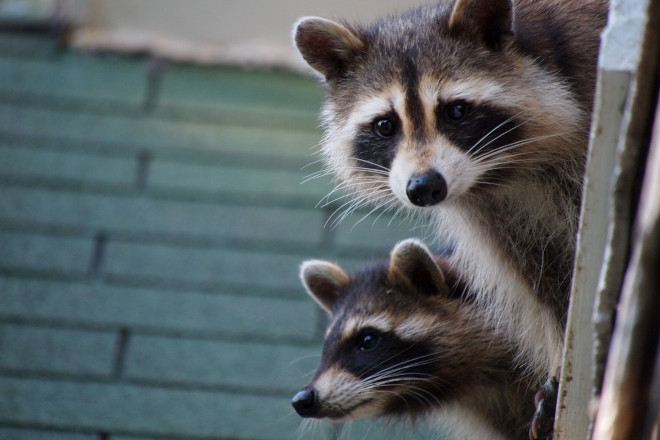Raccoon latrines are disgusting, hazardous piles of poop. Most of them contain the eggs of a dangerous parasite known as raccoon roundworm. This parasite does not harm raccoons very much, but it is lethal to humans, cats, and dogs. Latrines should therefore be removed as soon as possible. The challenge is to remove them correctly. Roundworm eggs are tough and can only be destroyed with high heat. Give us a call for raccoon latrine cleanup including hospital-grade disinfection and steam treatments.
If you want to remove a latrine yourself, start by putting on a mask and a disposable pair of gloves. Wear rubber boots and cover them with booties. Be careful not to touch your face or your clothes during the cleaning process. Spray the latrine with water or a household disinfectant, then bag the feces. Use a shovel or invert the bag and pick the feces up manually. Then, pour boiling water over the dirty surface to kill germs and roundworm eggs. When you are done, close the bag and throw it out with your gloves and booties. Scrub your boots clean with soapy water or disinfectant.
Remove the Raccoons on Your Property
If there is a latrine on your property, there is a raccoon living nearby. Raccoons like to den in attics, decks, and other quiet areas. Females especially invade homes in the springtime to raise their kits. When raccoons leave their dens at night to feed, they relieve themselves outside their dens. Call a professional wildlife remover for an inspection and solution to your raccoon problem. He or she will find where the animals are hiding and remove them humanely. A professional can also pest-proof your property to ensure that this does not happen again.
While you are ridding your property of raccoons, stop leaving any food outside and make the rest of the home inaccessible. Raccoons like to live in areas where they can find food and shelter. Even after removing a raccoon, it may come back and settle in a different part of the house. Cover your roof vents with steel mesh and seal the deck. Remove bird feeders, use locked garbage cans and stop leaving any pet food out – especially overnight. Always clean up after a meal outside so there are no scraps to share. Pick up any fruit that have fallen to the ground and protect your vegetables with row covers.
Call a Professional for Latrine Removal
Getting rid of a raccoon latrine is a difficult job that is best left to the professionals. Raccoon feces are full of dangerous bacteria and parasites that you risk spreading and becoming infected with. Feces can also be especially difficult to deal with when they are indoors or within attic insulation. Professionals not only have the tools to remove feces effectively, but the training to recognize where the animals are coming from. The technicians at Raccoon Feces Removal are experienced wildlife removers that would be happy to help you out.
